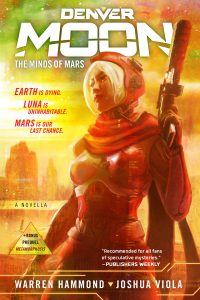Alex Marshall and Nicholas Eames In Conversation
Fantasy authors Nicholas Eames and Jesse Bullington (a.k.a. Alex Marshall) join us to talk about the musical inspiration behind their latest books.
NICK: Kings of the Wyld was inspired largely by ’70s rock, though a few gems from other eras snuck in there as well (here’s looking at you, Final Fantasy 7 soundtrack). The artists I found particularly inspiring included classic rock bands like Led Zeppelin, the Rolling Stones, and Black Sabbath, as well as more progressive groups like Yes, Rush, and Hawkwind. I’d be remiss if I didn’t include some particularly awesome solo acts like Bob Dylan, David Bowie, and Rod Stewart in there, too.
JESSE: I’ve got pretty broad tastes so am always mixing it up, depending on what scene I’m writing in particular, but metal was definitely the main thing I listened to throughout the project. Not just classic heavy metal, either, but everything from the crustiest, blackest extreme bands and gargling-on-blood death metal to the unabashedly over the top power and pagan metal outfits that often get a bad rap from the trve cvlt crowd. There’s basically no metal sub-genre I haven’t found something to love in, and in particular can’t get enough of all the new doom and occult rock acts. If you think you don’t like metal there’s a good chance you just haven’t found the right niche yet—contrary to its reputations as being the graveyard where clean singing and melodies are forever interred, metal is a vast musical landscape that can be eye wateringly harsh and defiantly ugly or literally symphonic and heartbreakingly beautiful.
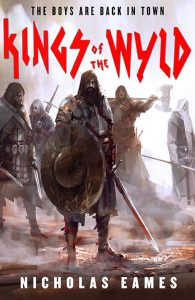
NICK: I agree, re: the many niches of metal. Most genres of music are like beer (trust me, this is going somewhere). I’ve heard plenty of folks blithely remark, “I don’t like beer,” except ‘beer’ isn’t one single taste you can like or dislike. There is beer that tastes like chocolate, or fruit, or tobacco, or grass. Claiming you don’t like beer (or metal) is like saying you don’t like any movies because you don’t like scary movies.
I’ll confess: I wasn’t the biggest fan of so-called ‘classic rock’ before writing Kings of the Wyld. Like black coffee or neat scotch, I knew it was something I should like long before I actually did. But now, having spent a year and more listening to it day after day, I understand how incredible it was.
The musicians of that time weren’t writing songs to fit snugly into radio playlists, or concerned about how they’d look in the music video. Drum sets were dragged into empty dining rooms to get just the right sound on an album, and guitar solos weren’t just catchy snippets—they were explorations, musical labyrinths that even the guitarists themselves found themselves lost in for minutes on end. Art thrives on the freedom of expression, and musicians back then (as opposed to today) had more freedom to express themselves.
JESSE: I agree that the older stuff is often more interesting than youngsters realize, but especially in terms of metal I think we’re actually living in a golden age of artistic expression. Studios may be less willing to go along with wild experiments, but it’s easier than ever before to record and release music outside of the studio system.
I got into metal pretty young, when the same older kids who introduced me to Dungeons and Dragons turned me on to White Zombie and Black Sabbath. Thinking back on it, I guess metal was the first musical genre that I felt was uniquely mine, if that makes any sense? Up until that point I had liked music just fine but had never really connected with it on a personal level, listening to whatever my family or friends were into, but as soon as I was exposed to those early tapes it was like an ancient black key turned in my brain, and everything clicked.
Metal has always had a strong aesthetic connection to fantasy and horror, which I’ve always appreciated, but there’s something way, way deeper to it than that. Dark power flows through the music itself, the strength that can only come from refusing to stay quiet even after being pushed down and locked away in the dark, and that’s present regardless of whether there are atmospheric lyrics or album art. People dismiss metal as just being angry or loud, but there’s a lot to be angry about, and unless you’re loud it’s easy to be ignored.
NICK: It’s true, metal and fantasy have long been associated with one another, with bands like Led Zeppelin and Hawkwind borrowing the mythology of Tolkien and Moorcock, respectively. To be honest, I’m surprised the mercenary bands as rock-stars thing wasn’t done earlier.
While Kings of the Wyld is seeded with musical Easter eggs that reference everything from Clapton’s nickname to Rush lyrics, music plays an integral part of the worldbuilding as well. The entire story is based on the premise that mercenaries who hunt and kill monsters have achieved the world-wide notoriety of rock stars. Even the terminology is borrowed from the music scene: quests are referred to as ‘tours’ and the bands are booked ‘gigs’ by money-hungry managers.
As well, each member of Saga (the mercenary band around which my story is centered) is based on an equivalent musician in a typical band: the glory-seeking lead singer, the uber-talented axe-man, the drink-addled drummer, the overlooked bassist, and that crazy dude that rings the cowbell, or plays the flute, or pounds the keyboard like madman with a wasp in his pants.
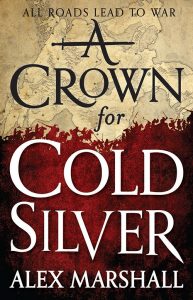
Lastly, the music I listened to while writing often informed the general feel or ‘cadence’ of a scene. Sometimes I’d have a song, a style, or an artist in mind and play them specifically, but often it happened a bit more organically. I’d throw on a 70’s playlist and suddenly a song would just fit. More than a few chapters in the book owe their existence to a particular song, as evidenced by the playlist I’ve posted on my website. From time to time I wish I’d had the foresight to call my chapters ‘tracks’ instead, though I’m not sure my editor would have gone for it.
JESSE: I’m right there with you in terms of random songs unexpectedly providing major inspiration—most of the references I make in the book are to musicians or songs I was previously familiar with, but some bands stumbled into my earholes for the first time as I was writing and left an indelible mark. I know some people don’t like listening to music when writing or even brainstorming, but for me it can be like a sound cannon blasting apart writer’s block. My muse is lightest on her feet when slamdancing.
The metal influence affects the tone and feel of the trilogy, but it also takes the form of Easter Eggs for fans. I’m not much of a linguist, so even if I’d wanted to create my own authentic-sounding fantasy languages that was never an option. Instead I incorporated references to various bands and musicians that felt appropriate for my own internal sense of aesthetics, as well as references to other writers, directors, and other artists.
Then of course the project features many of metal’s favorite themes: an obsession with the occult, hatred and violence, monsters and demons, sorrow and self-destruction. That’s all still just the skin, though, or the scales, depending, but the musical influence goes way deeper. The bones of this book are composed of metal. It’s the muscle that drives it forward, the ebon ichors that flow through it in place of blood. The essence of metal is basically the essence of human endurance—the refusal to stop struggling, even when all hope is in eclipse and there’s nothing left but rage at the inherent cruelty of existence. You keep fighting and you keep screaming, forever.
One funny anecdote: I was stuck on an early draft of A War in Crimson Embers. After talking with my girlfriend about the parts I was stuck on, she made me an inspirational playlist titled with the mantra: What Would Dio Do? That became my guiding principle on the project and helped me take the text to the next level.
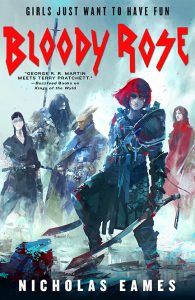
NICK: Your girlfriend sounds like a saint! Something similar, albeit on a smaller scale, happened to me as well. I was writing…let’s call it ‘the dragon scene’…and was completely stumped. I’d started and restarted it several times, and finally had to give up and go to work. On the way, ZZ-Top’s ‘La Grange’ happened to play, and suddenly the scene just materialized in my head. I listened to it again and again, plotting out the action based on the rhythm of the song, and when I got home I wrote the scene in one miraculous sitting.
It goes without saying that, without the influence of music, my book would have been a very different beast indeed. With yours it seems to have played a role in world building as well.
JESSE: Music plays a significant role in the world of the Crimson Empire—most cultures pass on their oral histories via song. Instead of having a metal influence, though, this part of the world building was overtly taken from rap, which I would argue is the modern successor of the bardic tradition. Boasts and beefs alike are bounced on regional rhythms and passed around with clever word play—think the sagas retold by Brockhampton instead of Seamus Heaney.
Nick, you mentioned posting a soundtrack for Kings of the Wyld, which is something I’ve always done with my novels, too. I’m curious if all of your tracks were things you listened to as you were writing, or if you hit on any of them after the fact? And if so, which ones, and why? For my part I’ll occasionally update my soundtrack playlists even years after the fact, if I discover something that really seems perfect, but it has to be pretty outstanding to warrant the revision.
When I’m brainstorming or editing I’ll listen to a lot of stuff, and it can be new or old, shuffled or in order. When I’m writing, though, I’ve found it helps me stay in the zone to listen to a familiar album or even a single song on repeat, often for hours on end. This experience seems to be shared by you and indeed, most writers I’ve talked to (at least, those who like to write to music). From a neurological standpoint it makes sense, as the repetition amounts to happy-making white noise after a while. What do you think were the Top Five Tracks you played on repeat as you were writing the novel? And did you only listen to each one as you were composing certain scenes, or did they provide more general background noise?
NICK: Most of my ‘soundtrack’ songs were essentially locked in by the time I finished writing the book, but I would certainly go back and add to it if something truly worthwhile occurred to me. As for the top tracks I listened to while writing? Zeppelin’s “Stairway to Heaven” and The Who’s “Baba O’Riley” were way up there. Lynyrd Skynyrd’s “Freebird” went on repeat for the entire last battle, and AC-DC’s “If You Want Blood” was a favorite as well. Lastly, Bob Dylan’s “Shelter from the Storm”. I tried to use the opening lyrics of that song to close out the book, but would likely have had to pay an arm and a leg to use them, so I went with THE END instead.
For the most part, I usually just threw on an album that had the ‘feel’ of what I was writing about in that particular session, or else something I knew would ‘fade away’ while still being present, if that makes sense. In those cases, Led Zeppelin, Rush, Fleetwood Mac, and Black Sabbath were regularly playing.
What are some of your top tracks? And is there an album (or a band in particular) that never fails to motivate you?
JESSE: I worked on the project for over five years, so some stuff I had on heavy rotation early on barely got played during the drafting of the last novel, but one band that was definitely there for the duration was Ghost (now Ghost B.C. in the states due to litigation haha). A lot of people give them shit—and give me shit for liking them!—and it’s funny, because the first time I listened to Ritual (their debut) I had all the negative reactions folk usually do, apparently…but something about their sound nested in my brain, and I tentatively gave them a second chance. And then I was hooked.
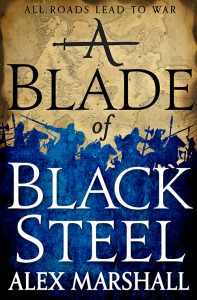
So yeah, Ghost always gets the ichors flowing. Their “Square Hammer” was definitely one of the tracks I listened to the most while working on A War in Crimson Embers. Given my unrepentant love for Ghost it probably won’t come as a surprise that I’m also a Blue Öyster Cult fan—“Vengeance” was another anthem for the Crimson Empire trilogy. And speaking of cowbell I can’t fail to mention Year of the Goat’s entire album Angel’s Necropolis! Endless repeats. And Christian Mistress’ “Neon,” Old Man’s Child’s “Demoniacal Possession,” Astarte’s cover of Accept’s “Princess of the Dawn,” and the Cradle of Filth cover of Sisters of Mercy’s “No Time To Cry” all got a ton of play.
But then I also bumped the hell out of Kate Bush’s “Running Up That Hill,” Florence + the Machine’s “Seven Devils,” and Akala’s “Mr. Fire in the Booth,” which demonstrates that as much as I love metal I did diversify my diet a bit. Beside eclectic singer-songwriters and English rappers I also listened to a lot of instrumental stuff by everyone from Lustmord and Eyvind Kang to soundtracks by Michael Nyman and Susumu Hirasawa.
What about you? Were there any bands or songs that you listened to a lot despite their seeming incongruous with the classic rock vibe of the novel?
NICK: A few, yeah, though only one of them is included in the ‘unofficial soundtrack’ on my website. That song is “One Winged Angel”, the theme song of Sephiroth (the bad buy from Final Fantasy 7). It’s such an awesome, eccentric, kick-ass song—right up there with some of the best John Williams musical scores, in my opinion.
“Pretender” and “Everlong” by the Foo Fighters were played occasionally while I wrote the final battle, and I suspect the latter will return for the soundtrack to book three. Lastly, “Work Song” by Hozier became something of an anthem for Clay Cooper, in particular the lyrics, “No grave can hold my body down, I’ll crawl home to her,” which pretty much sums of Clay in a nutshell.
JESSE: When you posted your soundtrack on your website you encouraged fans to suggest their own additions—did you end up receiving any suggested tracks there or elsewhere that you thought really fit? Or any that really didn’t, in your humble opinion as author? I would definitely submit Adam & the Ants’ “Kings of the Wild Frontier!”
NICK: I haven’t had anyone insist that a particular song be added, no—though a few of the ones on there were my brothers’ suggestions in the first place. That said, “Kings of the Wild Frontier” should probably be in there somewhere.
JESSE: Your Kings of the Wyld and my A Crown for Cold Silver feature a classic set-up: over-the-hill badasses getting the band back together for one last tour. Clearly we have similar sensibilities and senses of humor—and I’m guessing a childhood rich in roleplaying and the Blues Brothers?—but despite similar elevator pitches our projects obviously go in wildly different directions. While there are the inevitable hiccups (and body blows) along the way, Clay and Gabe are ultimately able to reunite Saga for one hell of a triumphant last gig—even if it’s not without cost. In my work, on the other hand, Zosia’s efforts to reunite her Five Villains seem about as ill-fated as Jake and Elwood’s—the old Cobalt Company is never really going to come together like they did in the old days, unless it’s in jail…or more likely, hell.
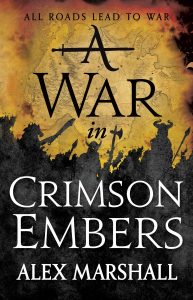
I’m just thinking out loud here, but I wonder if that fundamental divide can be traced back to the different music we listened to as we were creating our
narratives—my choices were more grimacing-with-fists-balled “everything’s doomed doomed dooooooomed…so let’s make some fucking noise on our way out” and yours is way more standing-in-the-bleachers-and-stomping-your-feet “hell yeah, old dudes still know how to rock!”
NICK: I’d say for certain we were both influenced at a subliminal level by the soundtracks we drew on for inspiration, and I’d be curious to know what other authors replied as heavily on music as we did. I know Sebastien de Castell has something like a soundtrack for his Greatcoat series, and Anna Smith Spark (The Court of Broken Knives) has a soundtrack for her first book as well. Do you know of others with similar practices?
JESSE: Paul Tremblay immediately springs to mind—it’s right there in the title A Head Full of Ghosts—and so does Molly Tanzer (Creatures of Will and Temper). Oh, and there’s a running series on the site Largehearted Boy that invites authors to submit the soundtracks for their most recent work, so clearly there’s more of us out there!
NICK: Good to know! So, with A War in Crimson Embers wrapping up your series (congratulations, by the way!), what are you planning next—and what music might you imagine serving as the backdrop for it?
JESSE: Thanks, it’s a great feeling to finally put the series to bed! As for what’s next, I’m always leery of going into detail about a work in progress…but I will tease that the writing soundtrack I put together is very different than the ones I used for the Crimson Empire. There’s still a lot of metal, but the whole thing is kind of a 90s time capsule so there’s also a lot more grunge, punk, and ska.
How about Bloody Rose? I’m stoked to see the new book take the stage this summer, and am curious if it has a different musical vibe from the first book? Guessing she won’t be content to be a cover band for her dad’s old crew! And are there any particular tracks you listened to while working on it?
NICK: Whereas Kings of the Wyld hearkens to the golden age of classic rock, Bloody Rose draws inspiration from the years afterward, when the stoic (if sometimes flamboyant) workmanship of the 60’s and 70’s bands gave rise to the wild and bombastic ‘motley crews’ of the 1980’s. In this era, rock stars proudly indulged in every excess under the sun. “Everything,” to paraphrase the poet, Jim Steinman, was “louder than everything else.”
The music that influenced Bloody Rose includes (among many, many others) The Cure, Def Leppard, Bonnie Tyler, Van Halen, Heart, The Clash, a ridiculous amount of Stevie Nicks, and a great big helping of Meatloaf.
Funny you mention your next project’s soundtrack being a ‘90s time capsule’ because I, too, will be turning to the 90’s when it comes to book 3, though my inspiration will include mostly early hip-hop, with a bit of Nirvana sprinkled in for good measure. It will certainly be cool to see what we each produce when drawing water from a similar creative well!
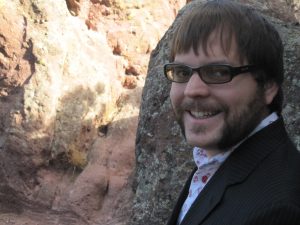
Alex Marshall is a pseudonym for Jesse Bullington, acclaimed author of several novels in different genres including The Sad Tale of the Brothers Grossbart and The Enterprise of Death. He lives in the Pacific Northwest.
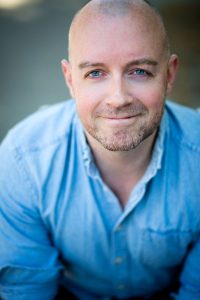
Nicholas Eames was born to parents of infinite patience and unstinting support in Wingham, Ontario. Though he attended college for theatre arts, he gave up acting to pursue the much more attainable profession of “epic fantasy novelist.” Kings of the Wyld was his first novel. Nicholas loves black coffee, neat whiskey, the month of October, and video games. He currently lives in Ontario, Canada, and is very probably writing at this moment.



